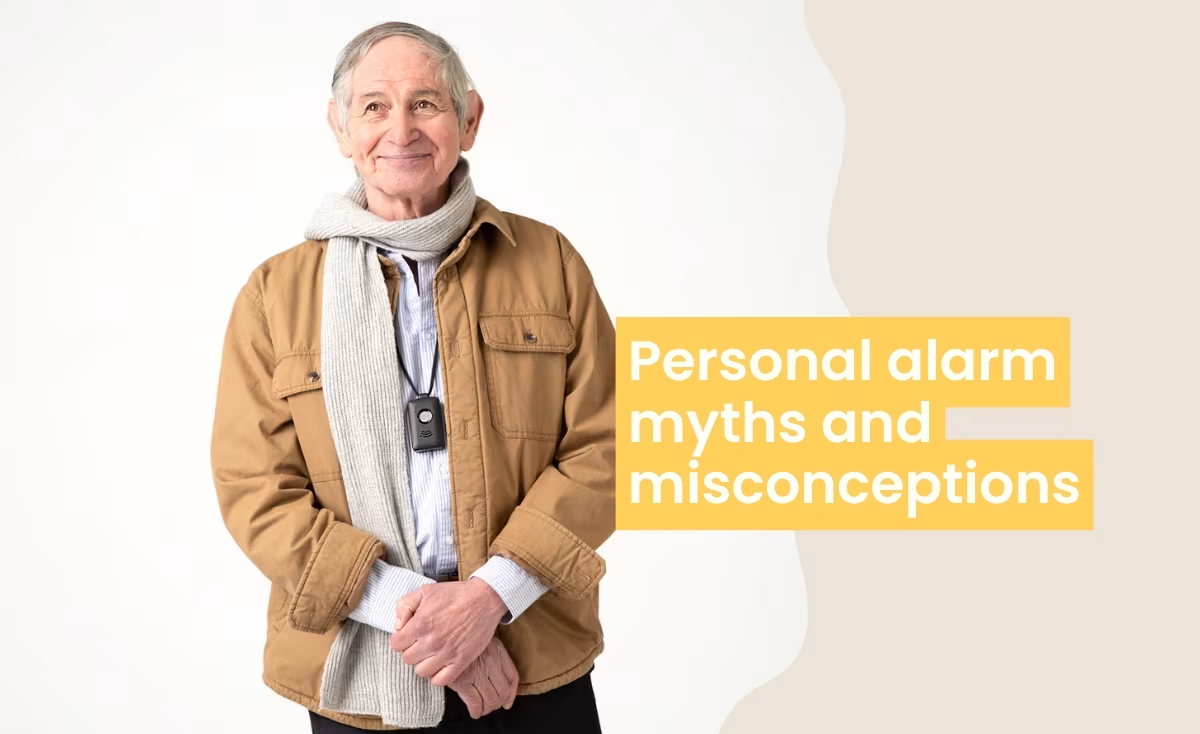Common Misconceptions About Personal Alarms

Personal alarms have transformed the way people stay safe and independent. These trusted devices offer a vital lifeline in an emergency — alerting a response centre or designated contacts when help is needed.
Yet despite their many benefits, personal alarms are often misunderstood. In this article, we’ll unpack common myths and explore the key differences between monitored and non-monitored systems — empowering you to make informed choices about your safety.
The Common Myths:
Myth 1: Personal Alarms Are Only for the Elderly
Personal alarms are suitable for anyone who values safety and quick access to emergency assistance. People who live alone, have chronic conditions, mobility limitations or are at risk of falls can all benefit from a personal alarm.
Myth 2: Personal Alarms Are Expensive
There are different types of personal alarms at various prices, making them accessible to most budgets. In Australia, there are federal and state-based government-funded programs that can cover the cost of the alarm of subsidise them for eligible people.
Myth 3: Personal Alarms Are Inconvenient
Modern personal alarms are small, lightweight and discreet — easy to wear wherever life takes you. Most are waterproof too, so they can be worn in the shower, bath or even the pool. The key is consistency: wearing your alarm at all times ensures you have fast access to help whenever you need it.
Myth 4: You Don't Need a Personal Alarm is You Have a Mobile Phone
In an emergency, a mobile phone might be out of reach or out of battery. Personal alarms, on the other hand, are always there, offering direct access to help without needing to navigate screens or apps. Monitored Personal alarms are purpose-built for emergencies moments, with 24/7 trained responders you can rely on.
Myth 5: Personal Alarms Infringe on Your Privacy
Personal alarms are only activated when you press the button or if a fall is detected by the sensors. The monitoring centre does not continuously track or record your activities or location.
Myth 6: I'm Safe When I'm At Home
Most falls in Australia happen in or around the home. While you may know your home well and feel secure, a fall or other emergency can happen unexpectedly. Wet floors, slippery surfaces, stairs, loose rugs or uneven ground in the garden can all pose a tripping risk. A Personal alarm is always with you for the moments that don'e go to plan.
Monitored vs. Non-Monitored Alarms: What’s the Difference?
Monitored and non-monitored (also known as autodial) alarms serve distinct purposes.
Monitored alarms connect to a 24/7 emergency response centre, where trained professionals can quickly assess your situation and dispatch help as necessary.
Non-monitored alarms only call or message a pre-set list of contacts, such as your family or friends. This means you’re relying on your contacts to pick up the call and then know how to help.
Benefits of Monitored Alarms
Monitored alarms offer 24/7 reliable safety. They connect you to trained staff who assess your situation and provide the details of the incident to emergency services who can prioritise the call and tailor their response. Your relevant health data is also kept securely in the system, so even if you can’t communicate, the monitor can provide critical information about your medical history to emergency services.
Which is better – Monitored or Non-Monitored Alarm?
Monitored alarms offer fast professional assistance 24/7 and are suitable for people who need reliable care, or those without a good support network. They are particularly beneficial for people who live alone and those who are at risk of falls or have undelying health conditions.
Non-monitored personal alarms are generally not recommended by Choice. They may be suitable for those at low risk who feel confident that family or friends can respond quickly in an emergency — anytime, day or night.
Funding For Personal Alarms
In Australia, there are various funding options to help subsidise the cost for eligible people. Options include Federal Government programs like Home Care Packages (HCP), Commonwealth Home Support Programme (CHSP) and the NDIS. There are also state and territory government programs like Personal Alert Victoria (PAV) in Victoria and Personal Alert AssistanceSA (PAASA) in South Australia.
If you’re not eligible for government funding, you can still purchase a personal alarm privately. Be sure to choose a reputable provider — and prioritise your safety and peace of mind.

.png)


.jpg)
